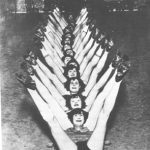Occupy Time
3 Thanks to Anustup Basu for his generous help in the preparation of this article. See, in particular, Carlos Ruiz, De la república al mercado. Ideas educacionales y políticas en Chile, LOM Ediciones, Santiago, 2010. 4. ^ José Joaquín Brunner, Hernán Courard and Cristián Cox, Estado, mercado y conocimientos: políticas y resultados de la educación […]








